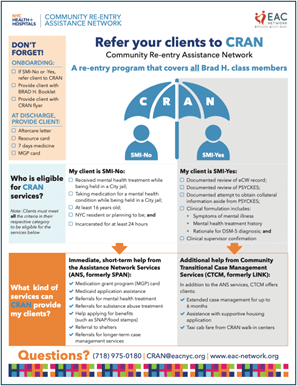Helping Individuals Released from Jail Access Mental Health Services
HIGHLIGHTS
- For people with mental health needs, ready access to quality services is key. Those recently released from jail face particular challenges connecting to services in the community.
- Working with partners in New York City, we developed communication materials for individuals released from city jails to facilitate connection to mental health services in the community. We also designed tools for support staff to better serve their clients.
The Challenge
People recently released from jail face particular challenges connecting to services in the community. Research shows that when people reentering the community after incarceration are able to engage in programs and services that respond to their individual needs—such as obtaining stable housing, substance use treatment, employment, and more—their chance of successful reintegration increases.
New York City’s Community Re-Entry Assistance Network initiative (CRAN) serves individuals who received mental health services while in city jails. CRAN aims to connect individuals to healthcare, housing, social, and vocational services in the community. CRAN engages individuals in case management transitional services, typically initiated during incarceration, and post-release services, available in the community.
Our Approach
Beginning in 2018, we partnered with NYC Health + Hospitals’ Correctional Health Services to develop outreach and communication materials for CRAN and help more people released from city jails connect to services in their communities. We designed new materials to inform CRAN clients about available services, and to help them make decisions about which services to engage in. We also designed tools for social workers and staff in jails and in community clinics to better understand the services offered through CRAN, the client eligibility requirements, and the intake and referral processes that they would guide clients through.
Materials included:
- Resource card for released clients: a portable card containing resources for clients in the process of transitioning from incarceration back into their communities
- CRAN flier for incarcerated prospective clients: an introduction to CRAN for prospective clients
- Booklet for incarcerated prospective clients: a summary of rights and entitlements for qualifying individuals
- Community partner flier: a primer for organizations working with prospective clients
Our designs were informed by our observation of the discharge planning process at Rikers Island and demonstrations of the intake process at CRAN’s community walk-in centers, as well as interviews with social workers, program staff, and clients. The new materials were designed to better fit the needs of CRAN’s prospective clients by presenting information more clearly and concisely; making action items stand out; and helping draw connections across different items through the use of consistent language and branding. Additionally, to meet the program’s needs, the designs were optimized for being reproduced in grayscale, and shared in an editable format so that they could evolve with CRAN’s services.
Designs ideas42 Created for the CRAN Initiative
Resource card for released clients:
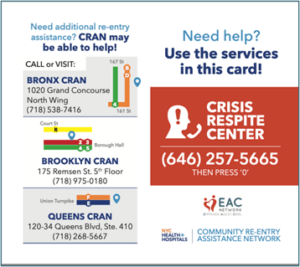
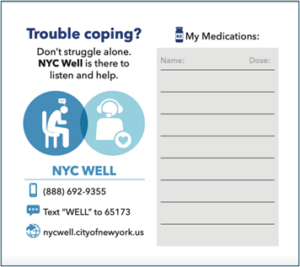
Pages from booklet for incarcerated prospective clients:
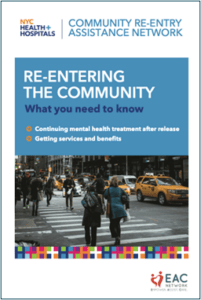
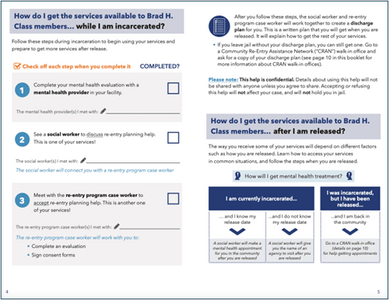
Social worker flier:
NYC Health + Hospitals has adapted these designs as needed for continued use in the field
Results
Correctional Health Services staff are providing the materials to people who are in custody in city jails, helping them prepare for their return to the community. Staff has shared that the Booklet helps clients and new staff understand complex service offerings, and that resource card has been an especially handy information source for people to refer to as they seek to access services after their release.
Takeaway
Helping people released from jail successfully reintegrate into their communities is a complex challenge, particularly for those with mental health needs. These solutions apply behavioral insights to better assist individuals when they leave jail, allowing them to engage in programs and services that respond to their individual needs.
Interested in learning more about this work applying behavioral science to a crucial social problem? Reach out to us: safetyjustice@ideas42.org or tweet at @ideas42 to join the conversation.
